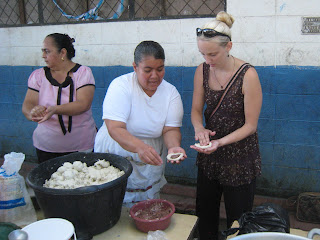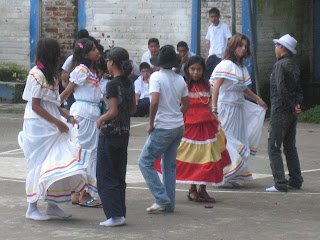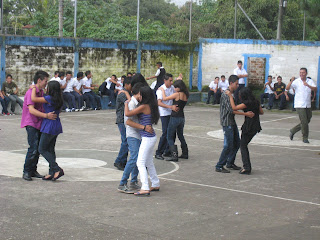I taught no classes today because we were having a Bicentennial Artistic Festival at school. I was a little confused as to why this was the “Bicentennial” Festival since El Salvador’s Independence Day was September 15, 1821. So we’ve still got 10 years to go. I asked Cecilia about this and she said it was because the first “cry of independence” was in 1811. Since I’m really interested in Salvadoran history I did a little looking on the internet and here’s what I found:
“Towards the end of 1811, a combination of internal and external factors motivated Central American elites to attempt to gain independence from the Spanish Crown. The most important internal factor was the desire of local elites to control the country’s affairs free of involvement from Spanish authorities. The main external factors motivating the independence movement were the success of the French and American revolutions in the eighteenth century, and the weakening of the Spanish Crown’s military power as a result of the Napoleonic Wars, with the resulting inability to control its colonies effectively.
On the 5th of November 1811, Salvadoran priest José Matías Delgado rang the bells of Iglesia La Merced in San Salvador, calling for insurrection and launching the 1811 Independence Movement. This insurrection was suppressed and many of its leaders were arrested and served sentences in jail. Another insurrection was launched in 1814, and again it was suppressed. Finally, on September 15, 1821, in light of unrest in Guatemala, Spanish authorities capitulated and signed the ‘Acta de Independencia’ (Deed of Independence) which released all of the Captaincy of Guatemala (comprising current territories of Guatemala, El Salvador, Honduras, Nicaragua and Costa Rica and the Mexican state of Chiapas) from Spanish rule and declared its Independence.” (Gracias, Wikipedia).
Today I showed up at school not knowing what to expect. I wasn’t really sure what was going to happen during the “artistic events” that they said would be happening. But the day before several of the teachers told me that they were going to be making pupusas and that they’d teach me how to make them. Now, although I’m made pupusas a few times in the past, I still was pretty bad at making them. So when I showed up today I went to go look for the food area. Sure enough, many of the teachers were there preparing to make pupusas.
I rinsed my hands, put a little oil on them, and was ready to begin. Milagro got me some masa (dough) and showed me how to shape it into a disk in my hands. Then you add a little of the filling (beans, cheese, loroco) and close up the masa around the filling. From there you shape the masa into a disk again, like a tortilla, and lay it on the stove. This sounds really easy but somehow it’s a bit more complicated than that. Everyone has their own way of making pupusas so as I was making my own I watched the others hand to see how they were doing it. I could tell one woman made them a lot and I watched in awe as she skillfully and rapidly made one pupusa after another.
I got better as I went along and although I’m nowhere near as good as many of the women in this country are I now feel confident that I too can make pupusas. And I made about 40 of them. But soon I saw that dancers and other bands were beginning to arrive. The teachers told me that I could go watch and take pictures. First I went to go wash my hands because by then my hands were covered in oil and masa. Then I checked out what the other teachers were selling: oranges, jocotes, little sandwiches, enchiladas. All the proceeds were going to help with the computer lab that’s been built at my school. It’s the very first one the school’s had and all the kids are now starting to receive computer classes. I got some pupusas since I hadn’t eaten breakfast yet and then I found a place to sit.
The masa for pupusas
Putting the cheese into a guacal
Adding the filling
Making it into a disk
There's mine
I did it!
Cutting up oranges
More pupusas
The woman in the middle is an expert
Little sandwiches
Enchiladas
After them came several different dance groups from schools around Berlín. The main schools in Berlín are the public boy’s school (Dr. Alonso Reyes Guerra) and public girl’s school (Meardi), which are both 1st to 9th grade, and the public high school (Prof. Gabriel Humberto Rodriguez), which is 2-3 years (like 10th – 12th grade) depending on the track the student takes. There is also a public kindergarten in Berlín. Then there is the private Catholic school which is 1st to 9th grade. Lastly, there are the 4 marginalized schools around Berlín which have significantly less students and money than the other schools and are located farther away in some of the colonias: La Chicharra, Brisas del Sol, El Mono, and Bob Graham. There are also some schools in the cantons, but they have even less resources than the marginalized schools.
Sitting underneath the sign
These girls wanted their picture taken
Waiting for the festival to begin
Here comes the band
Marching onto the cancha
Lookin' good!
The first dance group were 8 girls from the girl’s school. They danced in multicolored dresses holding onto comales with fake tortillas glued to them. A comal is an earthenware plate used for cooking tortillas, pupusas, or other typical food in El Salvador. The dance they did involved a part where they kneeled on the ground and rhythmically moved their hands as if making tortillas and putting them on the comal.
Dancing in a circle
Holding onto their comales
Next came a dance group from the Bob Graham school. I remember seeing them perform on Independence Day. They did the Dance of the Sopilotes. The word sopilote means “vulture.” Several boys were dressed up like vultures and the girls had on bright oranges dresses. At one point during the dance one of the sopilotes died and the others carried him away. The music was quiet and solemn. Then he was suddenly resuscitated and they sang about him being alive again.
Dance of the Sopilotes
Poor sopilote died
He's alive!
Walking back up the stairs
Then marched a group of a little more than 20 little boys from the Kindergarten school dressed in band uniforms and carrying a variety of percussion instruments. I was surprised that they were able to stay in formation as they walked. The group began playing and I was even more surprised how well there were able to play. I could tell that there were playing actual songs. There were two little girls dancing in front of the band that were pretty cute as well. At one point a group of 8 kids put down their instruments and made a line in front of the group to sing. I took a ton of pictures of them.
Here come the little kindergarteners
So adorable!
They did a good job of staying in formation
And they played well!
Singing and dancing
After that was a dance group from the Catholic school. The group included kids that represented coffee farmers, folklore characters, and modern day children. Some of the kids were dressed all in white and I’m not sure who they were supposed to represent. They had a couple props for their dance which included a little “hill” that Cipitío hid behind and a statue of his long-breasted mother, Sihuanaba. Yes, even the Catholic Church here accepts Salvadoran folklore. And at the very beginning of the dance one of the kids actually threw/released a dove into the air. It was fun to watch.
The Catholic school kids are up next
There's Sihuanaba
The modern day kids are sitting on the ground
Coffee dancers
With the boys now
Hula hoop time
Taking a bow
Following them was another group from the Bob Graham School. There were 4 boys and 4 girls doing a dance. The girls had on little blue and white dresses with the shield of El Salvador on them. The boys had white shirts and pants with little colorful patchwork pieces sewn on. They were adorable when they danced. Then came another group from the Catholic school. This time it was older girls all dressed in beautiful blue and white dresses. The skirts of the dresses were very full and the girls held onto them as they twirled. Later, three guys holding lit torches came out to join the girls in their dance.
Waiting their turn
I love their outfits!
Having a lot of fun
Beautiful dresses
The guys with their torches
Twirling here and there
Then three little girls from the Kindergarten School got up in front of everyone to dance. I could tell that one girl was definitely the leader of the group, and the other two girls watched her as they danced. I remember I started thinking that the red and black outfits of the little girls were what I considered kind of sexualized, especially for 5-year olds. For a moment I wondered if this was cultural considering what seems to be a high rate of teen pregnancy and general lack of discussion regarding anything sexual. But then I thought about the outfits I wore for my dance recitals; they weren’t too dissimilar. (My thoughts about the clothing choices of young girls here is going to wait for another blog).
Kindergarten dancers
The girl in the middle is the leader
Up next was the band from the local high school, the Instituto Nacional. Their band is larger than the boy’s school band with more instruments and percussion. I know their songs well since I often hear them practicing late into the night at the high school. There were boys and girls in the band which is always good to see. There were even a few girls playing percussion. Their group played about 15 minutes before marching back up the stairs.
The high school band arrives
Playin' loud
I love the percussion section
All about the brass
I wasn’t sure what school the next group was from. They had on the more traditional dresses that I usually see at these kinds of events. They really seemed to be having a good time as they danced. Following them was a small dance group from the canton of San Francisco. They were the only dance group from one of the cantons to perform at the festival. They only danced one brief number but I was glad they were able to come and perform.
I really want a dress like this
The group from San Francisco
Having a fun time
The dance after that was a more modern dance performed by girls from the Catholic school. They all had on pink shirts and jeans. There was quite a bit of whistling and shouting going on by the boys in the crowd during their dance which always makes me want to start whapping them upside the head and ask where their manners are, but I managed to refrain myself. It probably wouldn’t be good publicity for the school if a white teacher started hitting the students. But in all seriousness, the lack of respect that many young men (and adults) here have for women has always concerned and distressed me. But that too is another blog for another day.
Pretty in pink
They had a more modern dance
When they’d finished Eduardo took the microphone once more to thank everyone for coming and all the students for their performances. I went to say goodbye to the teachers and thank them for teaching me how to make pupusas. I had a good time making them and watching the groups perform. It was another fun day at school.
Boy's school band again
Ta da!
Coming down the stairs
What fun dresses!
They did a wonderful job
Dancing together
The high schoolers and their modern dance
Some of the spectators
Oh, this takes me back
(Seriously, it's been 10 years)
Nice. Taking pictures.
Part of the audience
There was quite a crowd
The place was packed

































































2 comments:
What I love most about your blog is the pictures. These are absolutely lovely. Thank you for sharing this.
Wow, all the costumes are fantastic. I can't believe how many festivals and celebrations they have. The kids all did a great job. That must have been a really fun day. And you got to make pupusas too. mmmm.
Post a Comment